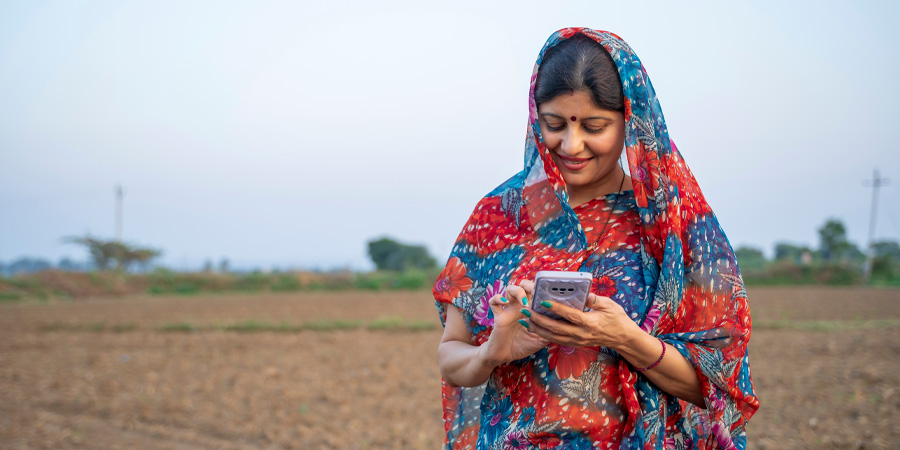In India, empowering women through telecom access is emerging as a transformative force, helping bridge the gender gap and fostering socio-economic growth. Despite the global rise in internet penetration, significant disparities persist, especially in low- and middle-income countries like India. Addressing these disparities is crucial to ensure inclusive digital growth and empowerment for women.
As of 2023, 70% of men and 65% of women globally used the internet, resulting in 244 million more men than women online. This disparity is particularly pronounced in India, where only 31% of women own mobile phones compared to 61% of men. Factors such as affordability, education, employment, religion, and caste significantly impact accessibility and contribute to the gender gap in digital inclusion.
Initiatives for Digital Inclusion
The internet arrived in India in 1995, opening up numerous opportunities for the country. On December 16, 2002, the Digital Empowerment Foundation (DEF) was founded to empower India's population by promoting digital literacy and access to information. At the time, only about 1.5% of the population had internet access.
The DEF provides digital literacy classes and tools to marginalized women, helping them become SoochnaPreneurs (digital information entrepreneurs) who offer digital services in their communities. This not only empowers these women but also ensures greater reliability, accountability, and community benefit.
Over two decades, the DEF has significantly contributed to increasing this number to nearly 700 million people, or about half the population. Despite this progress, rural areas, where 65% of the population resides, still face slower internet adoption. The DEF addresses the ongoing digital divide by working across various sectors such as finance, governance, education, livelihood, and health.
Latest Industry News: Mobile Internet Use Among Women in LMICs Surges by 120 Million
Economic and Social Impact
Technology plays a crucial role in breaking traditional gender roles and enabling women to access education, employment, and entrepreneurship opportunities. For instance, advanced AI and digital tools are empowering women to learn new skills, find jobs, and start businesses, thus promoting gender equality. This technological revolution is particularly beneficial for women in remote areas, providing them with the flexibility of freelancing and remote work.
The Self-Employed Women’s Association (SEWA) in India exemplifies the power of citizen-generated data. SEWA digitizes membership data of informal sector women workers, enabling better access to government services and strengthening their livelihoods. This approach demonstrates how grassroots-level data collection can empower women and improve access to essential services.
SEWA underscores the importance of implementing standards and quality control to enhance the credibility of such data, advocating for a comprehensive framework that involves various stakeholders like academia, economists, and informal sector workers. To address biases in data collection, SEWA employs a participatory approach, ensuring grassroots leaders and members design and implement data tools sensitively and culturally appropriately.
This method not only minimizes biases but also empowers informal women workers by linking them to essential government services. Despite the underutilization of citizen-generated data due to challenges in harmonization and standardization, SEWA's approach demonstrates significant potential for improving service access and creating job opportunities for women in the informal sector. Realizing this potential requires setting global standards, promoting data literacy, especially among marginalized groups, and further research to mitigate gender biases in data collection
The Indian government is also playing a role in this digital transformation. Initiatives like BharatNet aim to connect rural areas with high-speed internet, facilitating access to digital services for women in these regions. Furthermore, corporate entities are leveraging technology to promote gender equality. Companies are creating inclusive work environments, offering remote working flexibility, and investing in online learning and skill development for women.
Also Read: She Leads Bharat: Udyam Supports Women-Owned Small Businesses in India
Challenges and Future Directions
Despite these efforts, challenges remain. Affordability, digital literacy, and socio-cultural barriers continue to hinder women’s full participation in the digital economy. Ensuring that technology is used inclusively and equitably is essential to prevent women and girls from smaller cities from being left behind. Moreover, more work is needed to set standards for citizen-generated data, promote data literacy, and address gender biases in data collection.
India's future in digital inclusion, particularly for women, hinges on addressing significant gaps in access and affordability. With investments of 1.26 trillion rupees in semiconductor plants, the country aims to become a global electronics leader and reduce foreign dependency. As of January 2024, India has 751 million internet users, representing a 52.5% penetration rate.
Telecom Review Asia Exclusive Coverage: Women in Telecom: The Leading Lady of ZTE Corporation's Radio Frequency Department
Initiatives like Jangala's Big Box, which uses mobile signals to create hotspots, are partnering with local organizations to improve connectivity. For example, in Jharkhand and West Bengal, Jangala and ALIG Educational and Welfare Society have connected computer labs, enabling 200 women daily to learn digital skills, impacting around 9,600 lives so far.
Notably, several India-based companies are taking significant steps to increase women's inclusion in the telecom sector. Tech Mahindra has launched an All-Women SMART Healthcare Academy in Mumbai and provided digital safety devices for women employees. Intel India's "She Will Connect" program aims to bridge the gender digital divide by teaching women essential digital skills. Tata Consultancy Services (TCS) is recognized for its women-friendly policies, offering flexible work options and growth programs. Additionally, the SHEROES platform supports women's careers through initiatives like the Managed Remote Solutions (MARS) program, which helps women find remote work opportunities in various roles.
Telecom Review Asia Exclusive Interview: ITU Asia and the Pacific Region Focuses on Bridging Digital Divide Through Inclusive Development





